How to Use Coconut Oil for Your Beard & Its 13 Wonderful Benefits
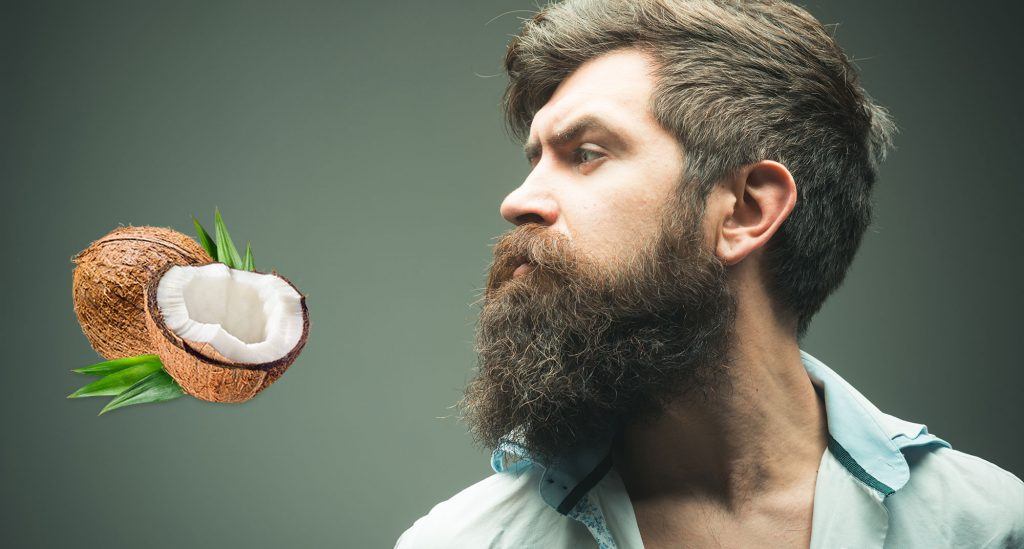
The last decade has seen the rise of “superfoods” in America and across the world, including coconut oil. Supermarkets became filled with coconut products as many people turned to natural foods and remedies while striving to lead healthier lives.
While coconut oil’s popularity has perhaps waned in recent years, its benefits – including coconut oil for your beard – remain worthy of discussion. Those benefits impact both body and mind, as numerous studies indicate.
Our focus for this article, however, is on coconut oil’s uses for the beard. According to its proponents, coconut oil stimulates beard growth, nourishes facial hair follicles and the skin underneath, and also provides hydration to the beard and skin while preventing infections and treating inflammations.
We’ll also discuss how to use and apply coconut oil for your beard, and more.
So, what is coconut oil, anyway?
As you might expect, coconut oil is oil extracted from the kernel of coconuts, mostly those grown in countries with tropical climates.
While its uses are just now expanding in some parts of the world, coconut oil for health-related use dates back thousands of years.
The good news is that it’s produced in large volumes and readily available around the world.
There are two types of coconut oil you’ll find in stores, virgin and refined. Virgin coconut oil is less processed than refined, which enables it to preserve much of its familiar flavor.
Refined coconut oil goes through more processing and tends to have a neutral smell and flavor – which makes it better as a cooking oil than virgin oil.
Coconut oil hasn’t always enjoyed superfood status, however, primarily because it has a high saturated-fat content. In fact, coconut oil is 83% saturated fat; by comparison, olive oil is only 14%.
When you consider that saturated fat raises cholesterol levels, it’s easy to see why many people steer clear of coconut oil. Moreover, the American Heart Association recommends that only 5-6% of a person’s calorie intake consist of saturated fat.
Coconut oil advocates say that the saturated fat found in coconut oil, as with other tropical oils, is rich in lauric acid, which can behave differently in the body than other types of saturated fat, making it less toxic to health.
They point out that coconut oil may increase a person’s level of “good” cholesterol, and also that coconut oil breaks down quickly and converts to energy.
The latter is one reason many people choose coconut and coconut oil as part of a weight-loss diet, although – as with most things – a less-is-more approach is advisable considering that one serving of coconut oil contains 121 calories (according to the U.S. Department of Agriculture).
There are many sides, and studies, to the coconut oil and saturated fat debate. Whether coconut oil has health benefits when included in a person’s diet remains a bit unclear, although lifestyle and dietary patterns also affect cardiovascular health.
For our purposes, at least with this article, what’s important are the potential health benefits of coconut oil when used topically, such as on the beard and skin.
Grooming products that contain coconut oil abound and many people praise their positive impact for treating hair and skin. We’ll talk more about coconut oil’s beard and skin benefits later.
Why Use Coconut Oil For Your Beard? Let us Count the Ways (and Benefits)
So, coconut oil is a rising star in the grooming and cosmetics world, as we’ve established. But we’re primarily interested in what coconut oil can do for beards, and it turns out that it has many potential benefits.
Is coconut oil good for your beard? The answer seems to be a resounding “Hell yes!”
1. No one likes beardruff and coconut oil offers a solution
If you have a beard, then the chances are very good that you’ve dealt beardruff – you know, those little white flakes of dry skin that can end up on your clothes, cause some embarrassment, and generally be a pain in the ass.
Coconut oil is a good product to have on your side in the fight against beardruff because it moistens the skin to prevent it from drying and flaking. It also prevents itching which can lead to flaking.
2. Coconut oil is tough on fungus and bacteria, too
Coconut oil has antifungal and antibacterial properties and can help get rid and prevent the buildup of bacteria and fungus that can lead to infections and other nasty stuff on the skin.
The moral of the story: Don’t let your skin become a breeding ground for nasty stuff.
3. Coconut oil packs a powerful one-two moisturizing punch
We just mentioned how coconut oil is a good weapon for fighting beardruff because of its moisturizing qualities.
But it doesn’t just hydrate your beard, it also hydrates the skin beneath your beard that can easily become dried out.
That’s why it’s important to make sure you massage coconut oil deeply into your beard – deeply enough that it penetrates hair follicles and reaches the skin for maximum nourishment.
4. Not satisfied with your beard’s growth? Try some coconut oil
Coconut oil helps its users in a variety of ways, including for overall beard health.
A healthy beard is typically one that – among other positives – is growing at a normal pace, and coconut is said to help in that area, too.
Coconut oil aficionados say that a consistent application of coconut oil encourages your beard to grow, both in length and thickness.
Coconut oil’s potential to also nourish and heal the skin beneath your beard helps stimulate beard growth.
Healthier skin means less irritation as hair follicles grow to the skin’s surface, while coconut oil also helps prevent the growth of wild hairs.
When the skin is healthy, your beard is healthier, as well.
5. Not happy with how your beard looks? Try some coconut oil
Coconut oil can give your beard a shinier, more attractive appearance (but not too shiny, unless you overdo it).
Some users say coconut oil surpasses other oils such as jojoba and argan when it comes to creating a nice-looking sheen on their beards.
You’ll also like how it feels because its moisturizing qualities help keep it from tangling and forming knots, while also preventing split ends and other damage to beard hair.
Your beard becomes more difficult to manage as it grows thicker and longer. Avoiding stray hairs and other issues that make it hard to style your is possible through the use of coconut oil thanks to the way it softens the beard down to its roots.
6. Coconut oil may boost hormones that enhance beard growth
Testosterone and dihydrotestosterone are the hormones primarily responsible for beard growth.
Higher levels of each generally – but not always – help men to grow thicker beards.
The chances of you developing a beard at an earlier age are higher if your beard hair follicles are more sensitive to testosterone and DHT.
On the flip side, men who have scalp hair follicles that are over-sensitive to DHT are more prone to male pattern baldness than other men.
That’s part of the reason why it’s not uncommon to see a man with a bald, or balding head, sporting a thick, full beard.
How does coconut oil fit into all of this? For starters, some studies show that coconut oil prevents oxidative damage of testosterone because of its antioxidant qualities, thereby promoting hair growth.
Lab rats whose diets included coconut oil had a higher activity of enzymes needed in the production of testosterone.
7. Use coconut oil to soften your beard
Given its powerful moisturizing punch and conditioning properties, it’s no surprise the coconut oil can make your beard softer and less prone to unsightly knots and tangling. And a softer beard has less broken and damaged hair follicles and is easier to shape into your preferred style.
8. Why coconut oil helps the shaving process
While coconut oil has many beard benefits, it’s also beneficial when used during any stage of the shaving process, including that it softens your beard and skin before the blades meet your skin.
You can also choose coconut oil as an alternative to shaving cream because it provides extra lubrication that helps your razor glide easily over your face.
Finally, it’s also helpful to use virgin coconut oil as part of your post-shave routine because it hydrates and softens the skin, and has skin-healing properties which can help prevent razor burns and bumps. It also has a natural scent, unlike synthetic aftershaves.
9. Coconut oil also is good for the hair on your head
The jury is still out regarding certain claims about coconut oil, such as that it prevents hair loss.
But, again, many, many people agree that it benefits overall hair health.
Meanwhile, at least one study showed that coconut oil helps prevent or reverse hair damage caused by overexposure to the sun, salt water, daily grooming, and various hair styling products.
The study above found that its participants who used coconut oil had the lowest rate of hair protein loss than those who didn’t use it. Protein loss is not uncommon for people that frequently use hair treatments and products, or that straight, comb, or heat their hair often.
Researchers involved with the study say that coconut oil’s effects on hair protein loss are because it’s a form of lauric acid – which, in turn, has an attraction to proteins that allow it to travel inside the hair shaft more than other popular oil treatments.
There are also other benefits associated with coconut oil use, including:
10. It can help you to burn calories faster
Triglycerides found in coconut oil can increase the number of calories you burn by up to 5% per day (when used in the right amount).
11. It can curb hunger
We’re further venturing into the weight-loss category here, but some experts say the regular use of coconut oil not only helps you to burn calories faster but also to curb your hunger and helping you to eat less.
Again, it comes down to coconut oil’s medium-chain triglycerides; men who consumed the most MCTs a day ate fewer 256 fewer calories per day than men who didn’t.
12. Coconut oil can protect your skin
We’ve already touched upon the benefits coconut oil has for the skin underneath your beard, which can easily become dry and irritated, so it’s no surprise that it’s also good for the skin all over your body.
Research shows that coconut oil, when used on people with dry skin, improved the skin’s moisture content while also reducing eczema.
Among the reasons why coconut oil is skin-healthy is that it contains vitamins E and K, both of which repair broken skin and decrease flaking.
Vitamin E is an antioxidant that also provides superior protection against sun damage, as well as aids in the treatment of skin inflammation.
Vitamin K helps treat skin conditions such as stretch marks, scars, spider veins, circles and bags under the eyes, and dark spots while also helping to heal wounds, bruises, and areas of the skin affected by surgery.
Physicians frequently use vitamin K to reduce swelling and bruising in patients who’ve just undergone surgery.
Coconut oil can also work as a sunscreen, albeit in a much milder, less protective way than lotions and sprays specifically designed to block the sun’s UV rays.
13. And, finally, you can use it to “oil pull” your way to better dental health
Oil pulling is a form of ancient Ayurvedic medicine that’s become increasingly popular in recent years as a way to improve overall dental health.
Swishing a tablespoon of coconut oil, or other natural oil, in your mouth for 20 seconds before spitting it out is said to kill and “pull” out some of the mouth’s harmful bacteria that could cause dental plaques and cavities.
14. Protects You From Nasty Beard Itch
The beard itch is a bittersweet aspect of growing a beard. On the one hand, the itch indicates that your beard is growing, but on the other hand, every man who has experienced beard itching knows how irritating it can be. Luckily, you don’t have to endure the itch!
You can use coconut oil to moisturize your brittle beard and soothe the pores to reduce itching. In addition, coconut oil also boosts beard growth.
15. Doesn’t Clog Pores
When you’ve set your mind on growing a beard, the last thing that you want is annoying acne under the beard hair. With coconut oil, you don’t have to worry about breakouts. Coconut oil predominantly consists of medium-chain fatty acids, which are known to fight off acne-causing bacteria.
So by using coconut oil on your beard, you’re enhancing the health of your beard hair and protecting the skin underneath. In fact, in a popular study, it was seen that coconut oil could kill off more acne-causing bacteria than Benzoyl peroxide, which is one of the most popular acne treatments.
Here Are 5 Things to Keep in Mind When Using Coconut Oil For Beard Health (A simple, illustrated guide)
1. A little coconut oil goes a long way
There’s no need to saturate your beard and skin with coconut oil.
True, coconut oil absorbs quickly into the skin, but your skin and beard can only absorb and carry so much of it. Apply a conservative amount of the oil in the beginning and only add more if you feel that your skin and facial can handle a bit more of it.
Another thing to keep in mind: you only need to apply enough coconut oil that’s ideal for the density and length of your beard, not another man’s beard. If your beard is short, there’s no need to apply the same amount of coconut oil as the guy with a lumberjack beard.
2. No worries, you’ll find coconut oil in other beard grooming products
How to make make the best use of our coconut oil for beard growth doesn’t have to be the same for everyone.
As we’ll soon discuss, you can add coconut oil to your diet if you don’t feel like applying it to your beard (or, even if you don’t mind applying to your beard).
You can also use coconut oil beard balm, i.e., balm infused with coconut oil – such as the Seven Potions Beard Balm
Beard balm, commonly referred to as “the lovechild of beard oil and wax,” helps moisturize facial hair while also providing a fair amount of hold. Some men think beard balm is an alternative to beard oil, but it’s OK to use them together.
Others confuse balm with beard wax, which offers the strongest hold thanks to beeswax.
If you’re a do-it-yourselfer, there are plenty of recipes for homemade beard balm that contain coconut oil. You’ll save money while creating something that your beard will appreciate, and while also channeling your inner mad scientist.
3. Don’t stress about applying coconut oil to your beard, because it’s easy
Putting coconut oil on your beard is, indeed, far from complicated. But there are wrong ways to do it, including by using too much of it for a single application (See #1 above).
It may take a little trial and error for finding the right balance between not enough and too much in the beginning, so it’s wise to err on the side of caution by starting with a small amount and only adding more if you need it.
Here are some steps to follow for using coconut oil on your beard:
STEP 1:
Your first step is making sure that your hands are clean and dry before you apply coconut oil. It’s also helpful to have a clean beard that’s dry. You don’t want to go spreading nasty germs from your hands to your beard.
STEP 2:
You won’t need to heat the coconut oil but rubbing it between your palms will melt it and make it sufficiently warm for the application.
STEP 3:
Apply the oil by starting at the tips of your beard hair and working into the roots and skin.
STEP 4:
Massage the oil in for a few minutes to make sure you’ve covered all of your beard and worked it to the skin. Leave it on for a few more minutes to ensure that your facial hair gets proper nourishment and hydration from the oil.
STEP 5:
If you’d like, you can use your coconut oil as a conditioner by massaging a small amount of it into your beard and then combing it thoroughly with a beard brush or comb.
STEP 6:
You can also add essential oil, such as peppermint oil, to your coconut oil and apply it to a clean, dry beard.
Or, you can add some carrier oils, just as jojoba and almond, to also help a beard’s growth and appearance.
Jojoba oil helps sooth the skin and unclogs hair follicles, while almond oil absorbs easily into the skin to help prevent dryness and itchiness.
STEP 7:
Always use unrefined virgin oil for treating your beard hair (and scalp hair) issues.
STEP 8:
Consistently combing and brushing your beard helps pull out dry, brittle hair while leaving a healthy layer behind.
4. How often should you use coconut oil on your beard?
Another benefit of coconut oil is that you can use it daily as part of your beard care routine. But once a day is plenty; there’s no need to slather some more on any time your beard or skin underneath it feels dry. Your best is to provide it either in the morning or at bedtime.
5. Yes, you can ingest coconut oil as part of your beard grooming routine
Eating or otherwise ingesting coconut oil is a safe and often effective way to enhance your beard’s health. Indeed, consuming coconut oil is said to increase the efficiency of hormones that help with beard growth.
It’s not for everyone, but ingesting coconut oil once a day may have a surprisingly strong impact on your beard’s growth.
Some of the ways that you can add coconut oil to your diet include consuming a teaspoon of it each day or by adding it to your morning coffee. You can also cook with it and there are many, many recipes out there that include coconut oil in the process.
Some people even spread a small amount of virgin coconut oil on their toast, or add it to their favorite smoothie.
The only downside of consuming coconut oil is that it is, as mentioned, high in saturated fat. If that’s a dealbreaker for you, then olive oil is a better cooking choice.
6 Ways in Which Coconut Oil is Extracted and Produced
Like others oils that are extracted and refined for a variety of uses, including as part of a beard care routine, the production of coconut oil occurs in several ways:
1. Dry process
Dry processing is a common way of producing coconut oil and involves drying the meat extracted from the coconut and then dissolving it with solvents to produce raw oil. The oil from this process isn’t used for human consumption, however.
2. Wet Process
The wet process uses the raw coconut without drying it. Its downside is the loss of oil that occurs when producing a suitable amount of it.
3. Refined, Bleached, & Dehydrated
RBD is similar to the dry process except that a hydraulic process with the use of heat extracts the oil from the dried coconut meat.
5. Hydrogenation
Hydrogenation takes RBD a step further by taking RBD’s extracted oil and heating it again. The production of refined coconut oil utilizes the hydrogenation and RBD methods.
6. Fractionation
The fractionation method involves breaking up the various fats and separating them from the oil. This method is beneficial in that it helps extract fats or acids that have beneficial uses.
What Type of Coconut Oil is Best for Beard Growth?
Virgin coconut oil is the best, and only, choice to add to your beard grooming routine, primarily because it doesn’t contain additives that may irritate the skin and make your beard dry and brittle.
If you’re shopping for coconut oil for the first time with the intent of using it on your beard, make sure that the product you choose is organic, virgin, unrefined, additive and perfume-free and, preferably, one that’s ECO certified.
An ECO certification means that a product is environmentally friendly, among other things.
We’ll conclude our look at coconut oil and its beard benefits by first saying that you shouldn’t view it as a miracle drug.
There’s plenty of evidence that shows that coconut oil has a positive effect on your beard’s health and growth, but also that you shouldn’t view it as a way to prevent beard hair loss.
What it can do, however, is strengthen your beard and nourish the skin underneath to help keep it healthy. You may need to look for other solutions if your beard is patchy and prone and one that with uneven growth patterns.
How to Make Your Coconut Oil At Home
If you’re someone who swears by DIY skin and hair care products, then you might want to know how exactly you can prepare your own coconut oil for your beard. Well, the good news is, it’s pretty simple.
Here’s a list of everything you’ll need to get started:
- A spill-proof, airtight, 1oz bottle with dropper
- Virgin coconut oil and jojoba oil (½ oz each)
- 7 to 8 drops of rosemary and lavender oil
Step 1- Prepare the Bottle
Wash the bottle thoroughly to ensure it’s clean and dry it so that not one drop of water is left behind. The water drops can dilute the solution and decrease its effectiveness.
Step 2- Pour in The Coconut Oil & Jojoba Oil
Once you’re confident the bottle is clean and dry, pour in the coconut and jojoba oil one by one. There’s no need to preheat the oils; you can use them at room temperature.
Step 3- Add The Rosemary and Lavender Oils
Use a dropper to add exactly 7 or 8 drops of Rosemary and Lavender oil each. Just like coconut oil, they help you grow and maintain a healthy beard.
Step 4- Close The Lid and Let the Oil Mix
Once it’s done, you can close the lid. You can shake the bottle a couple of times to mix the oils better – and that’s it! You can use this DIY coconut oil solution instead of your regular beard oil.
How to Store Coconut Oil Properly
If you don’t want your coconut oil to go rancid quickly, here are a few things you need to keep in mind while storing it:
Storing it in The Refrigerator
Coconut oil solidifies in low temperatures, which makes it stay good longer, but it may become a little challenging to use solidified oil. However, it also has a low melting point. Rubbing the solidified oil between your palms is enough to melt it.
Storing it at Room Temperature
If you want to store it in a cabinet or on a shelf, keep it in a dry place in a spill-proof bottle. Make sure the container is air-tight. This will reduce the rate of oxidation, and your oil will stay good for longer.
Conclusion
We’d love to hear from you. Have you used coconut oil to improve your beard’s health? Has it helped it grow? As always, we welcome your feedback and suggestions
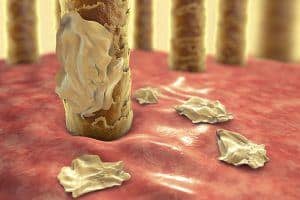

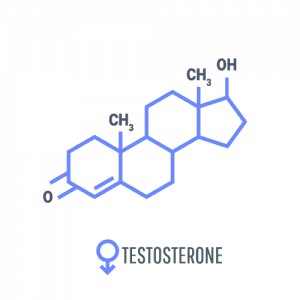
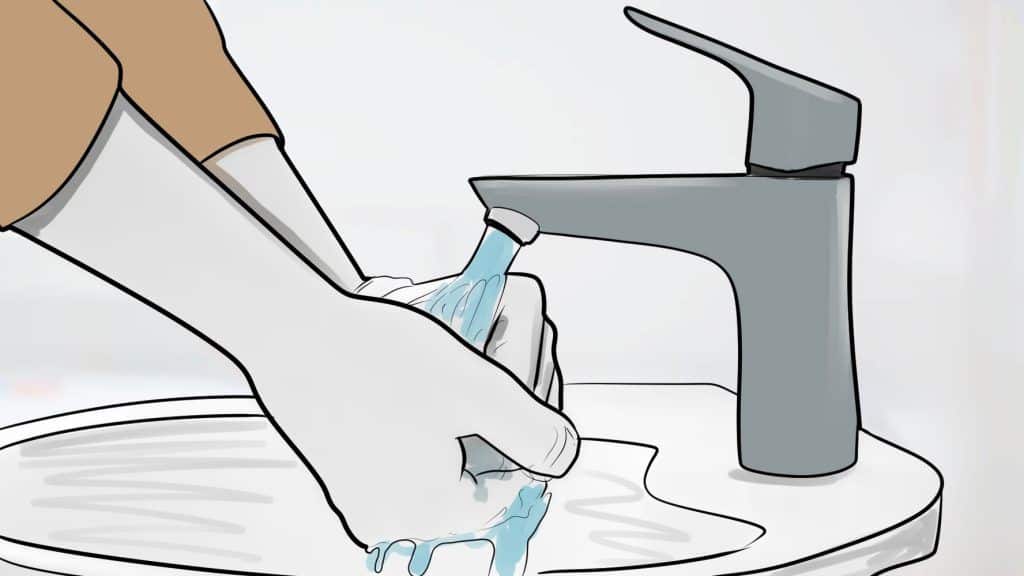
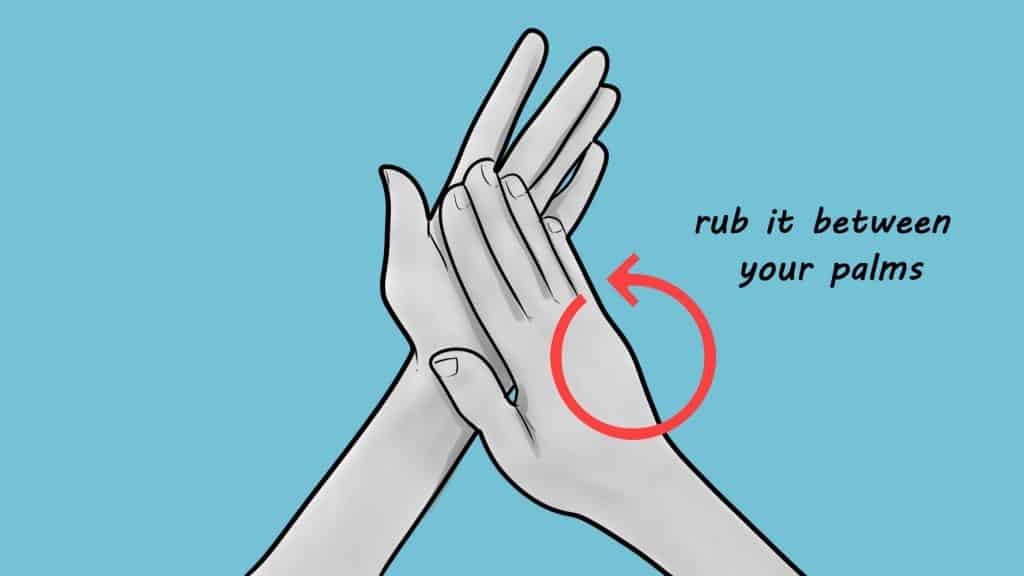
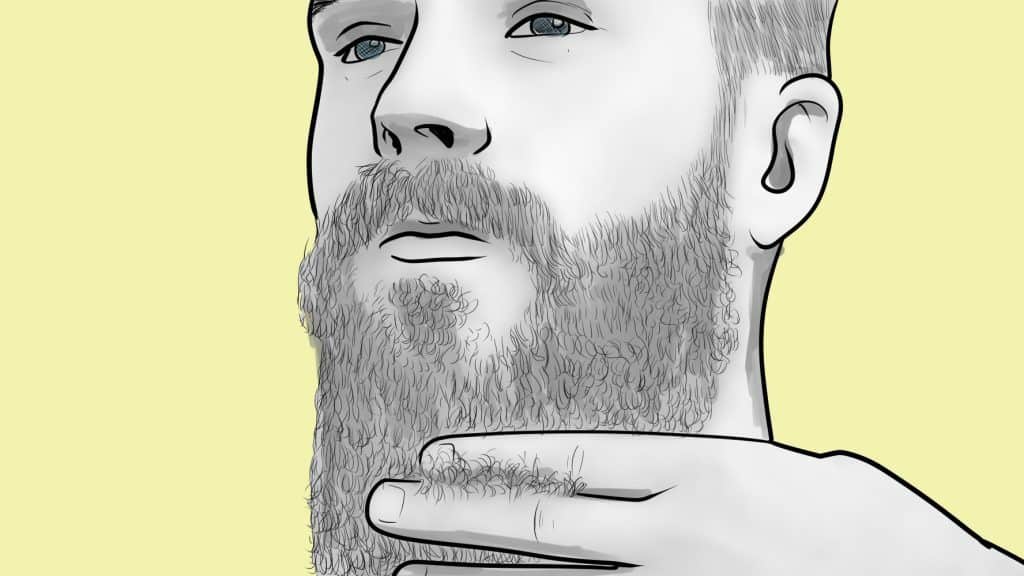
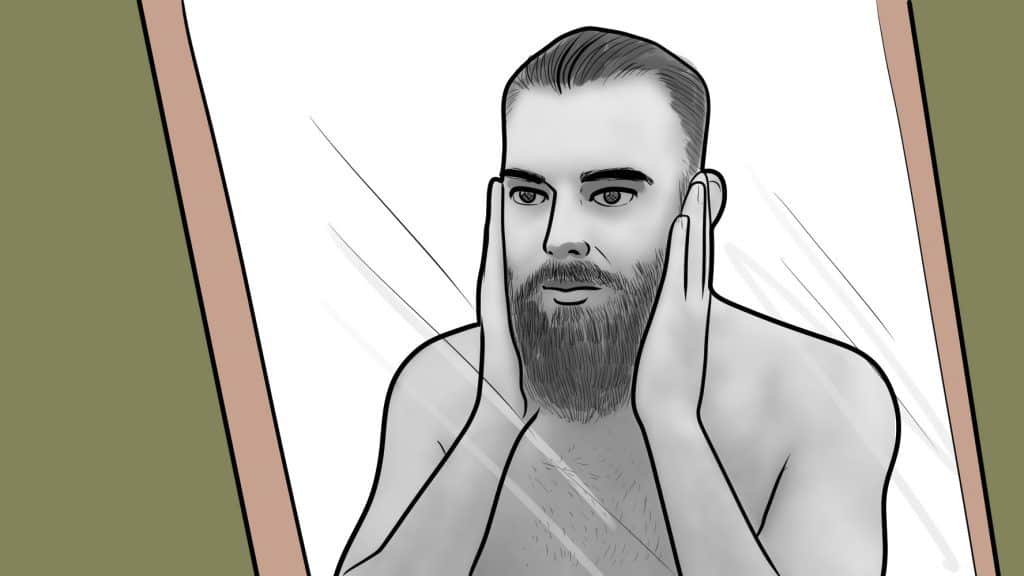
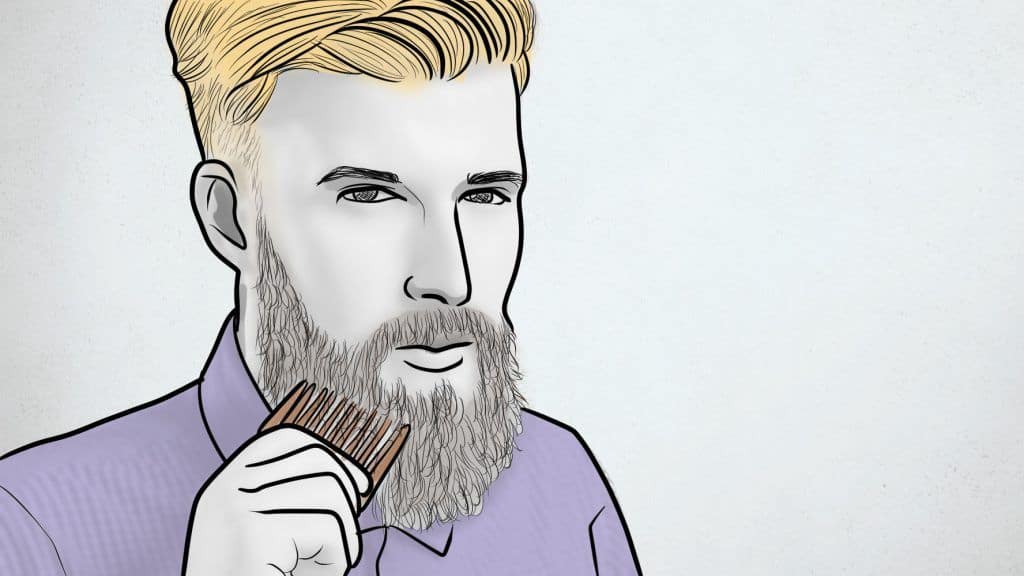
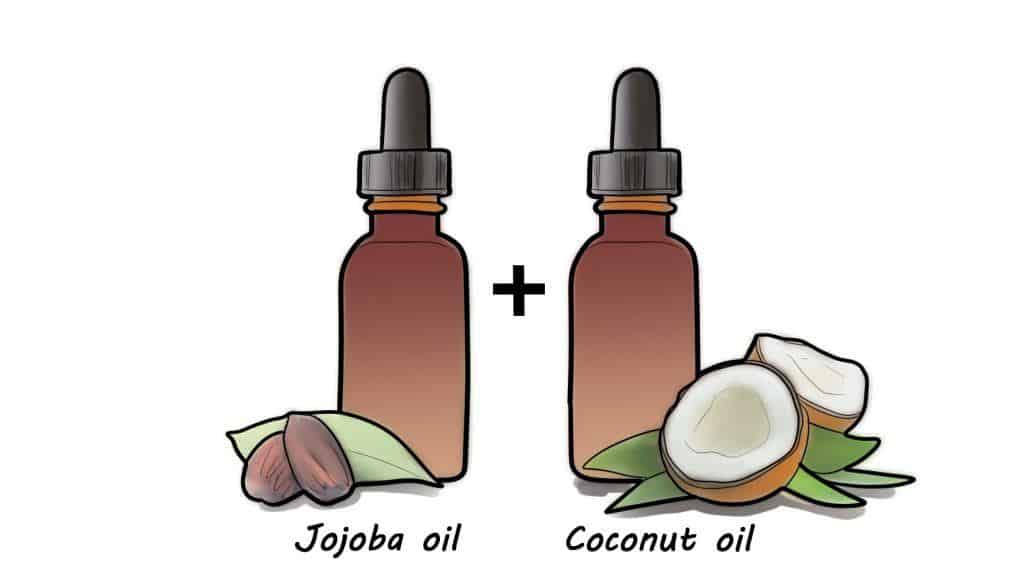
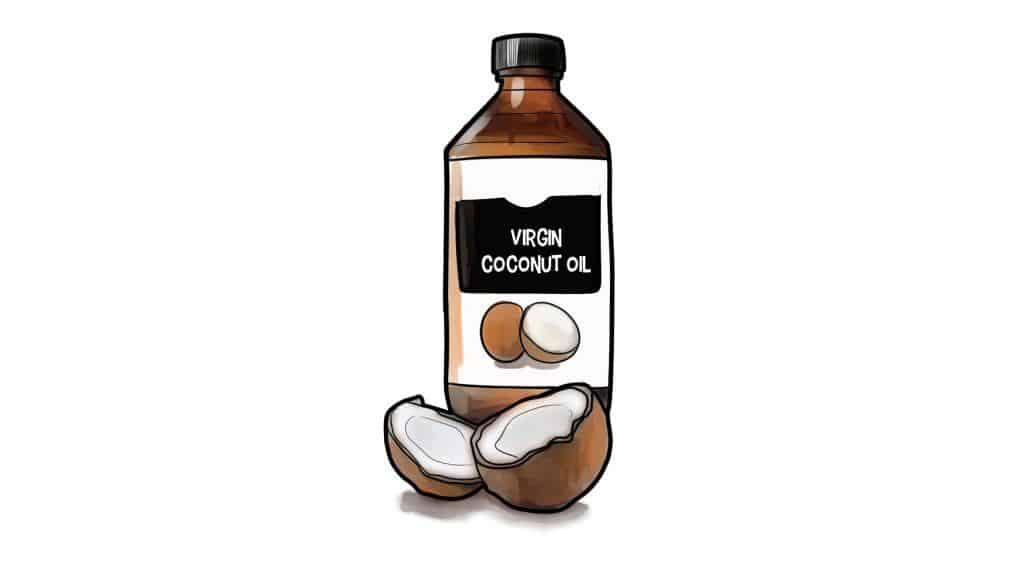
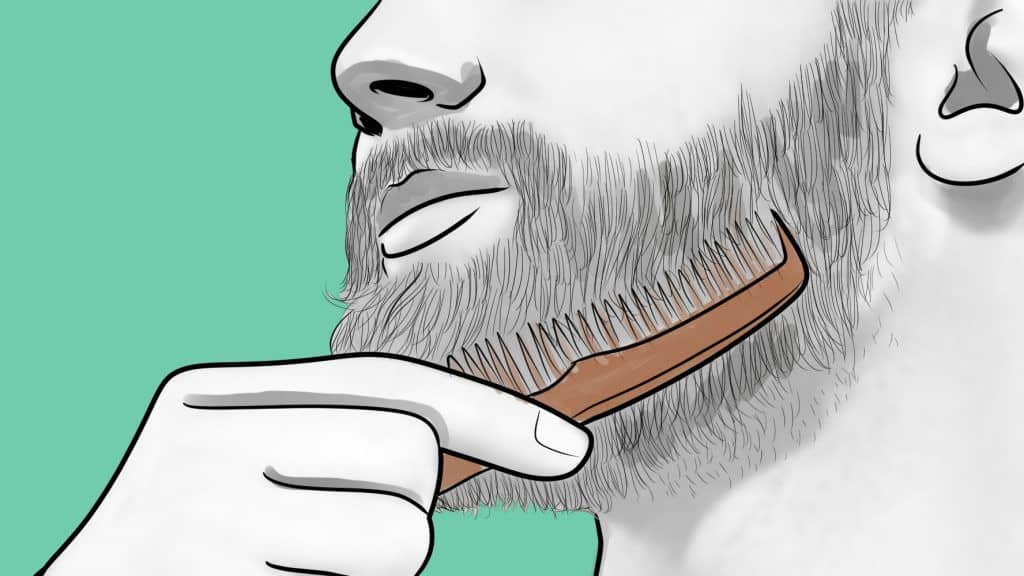
6 Comments
Thanks -Great all round articles on Beards Domen. Beneficial information combining the History on beards with today’s research. Creative well written and very helpful.
Growing a first time beard- Cheers B
Thank you.
Does coconut oil kill the root of gray beard?
Option 1 Do you need to get only the white beard wet with coconut oil for 1 month and the gray hairsr Will disappear
Option 2 Do i need to wet my gray beard with coconut oil everyday and wait 2. Or 3 weeks for my gray hairs to disappear for ever?
Or if i shave my beard and i see my skin is clean do i apply coconut to my skin after its shaved and then i can wait a few weeks to find out if coconut oil killed the roots of my white hairs?
Or do i need to take coconut pills to kill the root of my gray beard i only have it on 2 parts of my chin.
1 i have GRAY on the right side of chin corner where chin ends and on theLeft side where chin ends there under my neck.
But the rest of my beard is brawn thats
strainge info 9512611853
Coconut oil is so underrated, when the mix is right I think it’s the perfect beard oil. I’ve been using Dingo Dan’s Coconut Island Beard oil. It’s vitamin rich and gives my beard a much fuller look and rich shine. I’d highly recommend it. Great reviews guys, keep up the great work!
coconut oil is indeed the most beneficial oil and has many benefits, I used for my hairs and ofcourse for beard, I think it is the most less cosmetic way for the healthy beard!
I do use coconut oil for quite a few things from cooking to beard and skin and love it.